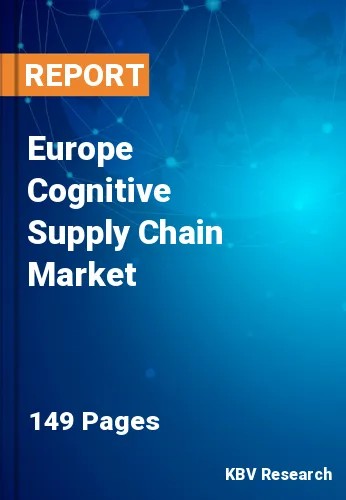The Europe Cognitive Supply Chain Market would witness market growth of 14.6% CAGR during the forecast period (2023-2030).
This cost-effectiveness makes cognitive supply chain solutions appealing to businesses seeking to remain competitive in the current dynamic market environment. The growing acceptance of cognitive technologies is not confined to a single industry but can be observed in various fields. As more businesses observe the tangible advantages of these solutions, the market should experience a rise in adoption rates. This growing interest and adoption of cognitive technologies will likely contribute to the market's growth.
Automation, which has revolutionized how businesses manage supply chain processes, has significantly impacted the adoption of these solutions. Companies can automate various repetitive and time-intensive supply chain tasks using machine learning and robotic process automation (RPA). Machine learning is a subset of artificial intelligence (AI), allowing these methods to assimilate insights from historical data, thereby identifying patterns and trends humans may miss. Therefore, the system can make accurate predictions and data-driven decisions. For example, machine learning (ML) algorithms can analyse historical sales data and other variables to predict future demand, ensuring optimal inventory levels.
Europe strongly emphasizes sustainability and reducing the environmental impact of supply chain operations. Cognitive supply chain solutions can help optimize transportation routes, reduce waste, and minimize energy consumption, aligning with Europe's sustainability goals. The European Union (EU) has stringent regulatory requirements for several industries, including automotive, healthcare, and food production. These technologies can assist companies in ensuring compliance with EU regulations, quality standards, and safety requirements. The European retail sector is adopting the solutions to optimize inventory, improve demand forecasting, and enhance the customer experience. Personalized shopping experiences and efficient supply chain operations are driving this trend.
The Germany market dominated the Europe Cognitive Supply Chain Market, By Country in 2022, and would continue to be a dominant market till 2030; thereby, achieving a market value of $1,390.9 million by 2030. The UK market is exhibiting a CAGR of 13.6% during (2023 - 2030). Additionally, The France market would experience a CAGR of 15.5% during (2023 - 2030).
Based on Deployment Type, the market is segmented into On-premise, and Cloud. Based on Technology, the market is segmented into Internet of Things (IoT), Machine Learning, and Others. Based on Enterprise Size, the market is segmented into Large Enterprises, Small & Medium-sized Enterprises. Based on Vertical, the market is segmented into Manufacturing, Food & Beverage, Logistics & Transportation, Retail & E-commerce, Healthcare, and Others. Based on countries, the market is segmented into Germany, UK, France, Russia, Spain, Italy, and Rest of Europe.
Free Valuable Insights: The Global Cognitive Supply Chain Market will Hit $20.7 Billion by 2030, at a CAGR of 14.8%
The market research report covers the analysis of key stake holders of the market. Key companies profiled in the report include SAP SE, Oracle Corporation, Accenture PLC, IBM Corporation, Intel Corporation, NVIDIA Corporation, Honeywell International, Inc., C.H. Robinson Worldwide, Inc., Amazon.com, Inc. and Panasonic Holdings Corporation
By Deployment Type
By Technology
By Enterprise Size
By Vertical
By Country
Our team of dedicated experts can provide you with attractive expansion opportunities for your business.

